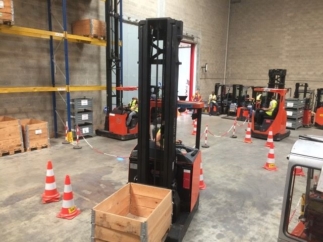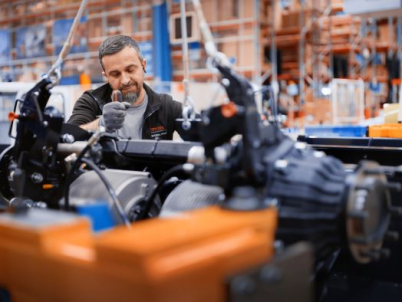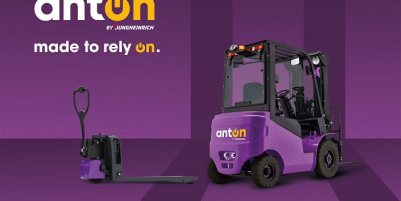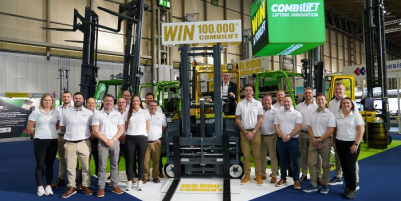-
GOPLASTICPALLETS.COM AND GOMI TEAM UP TO CREATEINNOVATIVE TECH FROM END-OF-LIFE PALLETS - 1 day ago
-
Nulogy Introduces the Manufacturing Operating System - February 27, 2026
-
Bliss Direct scales to 300 daily orders and saves 25 hours per week with Forterro’s Orderwise ERP - February 25, 2026
-
Wootzwork raises $6.6M to bring predictability to offshore manufacturing - February 25, 2026
-
Rite-Hite unveils new range of hydraulic kits to upgrade and extend dock leveller performance - February 19, 2026
-
REWE and Cimcorp automate fresh supply chain for Berlin supermarkets and stores - February 19, 2026
-
Q1 – A recovery period or time to fix, switch and scale? - February 19, 2026
-
NULOGY’S SHOP FLOOR SOFTWARE TO POWER COMPLETE CO-PACKING’SOPERATIONS - February 13, 2026
-
Why lead generation depends upon good content - February 13, 2026
-
Wallapop and Albatross Sign Strategic Partnership to Bring Real-Time AI Discovery to the Future of Consumer-to-Consumer Commerce - February 12, 2026
Improved forklift safety, lower running costs and reduced downtime are among the many benefits that lift truck operator training will bring to a business, says Nick Faulkner, Training Manager of Toyota Material Handling UK
While the rate of fatal workplace accidents involving a lift tuck has been on a downward trend in recent years, the number of serious forklift-related incidents recorded in the UK remains stubbornly high at around 1500 every year. Indeed, if you type ‘forklift truck accident’ into your search engine you’ll get a seemingly endless list of links to stories that highlight the injuries suffered by workers when the materials handling equipment that they had been operating or were working close to was not operated safely and correctly.
Workplace accidents often come with a huge physical and psychological cost for the victim and their family, and any employee or employer found to have contributed through their negligent attitude to workplace safety can expect to receive a stiff penalty.
When, for instance, the action – or, more usually, the failure to act – of an irresponsible employer is considered likely to have been the main contributor to a serious workplace accident, a charge of criminal negligence can be brought against the ‘duty holder’. The ‘duty holder’ is usually a director of the company or a member of its senior management team and in extreme cases, this person can be sent to prison if the company has fallen critically short in its ‘duty of care’ obligations to its staff.
Generally, however, the punishment handed down by the courts to a company or individual deemed responsible for a forklift-related workplace accident is usually a financial one.
The sums involved are significant: the average fine imposed by the Health and Safety Executive (HSE) for health and safety breaches has more than doubled in the past five years and now stands at nearly £98,000. Plus, of course, compensation claims arising from the incident will almost certainly add significantly to the final total.
Training is key
Given that most lift truck related mishaps tend to be a result of operator error, the management and training of drivers is clearly vital if the risk of an incident is to be minimized.
Forklift operator training has three stages:
• Basic training which covers the fundamental skills and knowledge required to operate a lift truck safely and efficiently.
• Specific job training to give drivers an understanding of the operating principles and controls of the lift truck – or trucks – that they use and how it will be employed in their workplace; and
• Familiarisation training which applies what has been learnt, under normal working conditions – ‘on the job’
Basic and specific job training can be combined but should always take place away from the warehouse environment, while familiarisation training must be done ‘on the job’, under close supervision.
While there are many issues which will impact upon the speed at which everyone learns, courses typically last 3 to 5 days. Operators with some experience of lift trucks or relevant experience of similar vehicles may need less extensive training than those with no experience, however it should be remembered that an operator with basic training on one type of lift truck or handling attachment cannot safely operate others on which they have not been trained without additional conversion training.
Good training not only produces safer forklift operators: skilled operators will also perform more effectively throughout their shift. For example, throughput efficiency is enhanced while accidental damage to the truck, goods and the infrastructure of the building caused by a careless operator is reduced. And by driving in a professional way an operator puts less strain on the truck’s engine and other essential components, so truck downtime is cut and fleet running costs are minimised. A truck that is driven carefully also uses energy more efficiently too – further boosting profitability.
And, yet, despite the substantial advantages that trained operators bring to a business it is surprising how many warehouse managers or supervisors treat training as an afterthought or just another unwelcome business cost.
Training you can trust
It’s important to use forklift operator training provider that is accredited to one of the recognised warehousing and logistics transport training accrediting bodies.
The UK has four main training accreditation organisations serving logistics and supply chain equipment operator training providers – AITT, ITSSAR, NPORS and RTITB. In simple terms these accrediting bodies ensure that training providers – such as Toyota – deliver up-to-date and highly relevant courses that are aligned with industry standards that give ‘students’ the knowledge and skills they need.
In other words, training providers who are accredited either by AITT, ITSSAR, NPORS or RTITB have demonstrated that they consistently deliver training programmes that surpass the highest industry standards. For instance, this means that they only use registered instructors who are regularly monitored to ensure that they not only possess exceptional knowledge but also have a first-class teaching style.
Don’t get complacent!
Naturally, it is easy to become less focused on a task if you have been undertaking the same activity eight hours-a-day, five days-a-week, 52 weeks-a-year for several years.
But complacency is considered the single biggest cause of lift truck accidents and if forklift operators are too relaxed deficiencies are likely to creep in to their driving and they may even become slow to notice potential hazards that put themselves and their co-workers at risk.
To help avoid complacency becoming an issue and because even the most diligent forklift operator’s skills fade over time, it is hugely important for even the most experienced lift truck operators to be given regular refresher training.
While there is no legal requirement for operators to receive refresher training at set intervals it is recommend that they are re-assessed and retrained on key aspects of their job every three to five years to ensure that they continue to operate lift trucks safely and perform at optimum efficiency every day.
Of course, if warehouse managers become complacent about training, they’re risking their company’s bottom line profitability and, most importantly of all, the health and wellbeing of every person in their team – there are courses for warehouse managers and supervisors too!To find out how Toyota’s dedicated forklift operator training and courses for managers and supervisors can help you make your operation safer and more profitable visit https://toyota-forklifts.co.uk/solutions/operator-training/

































